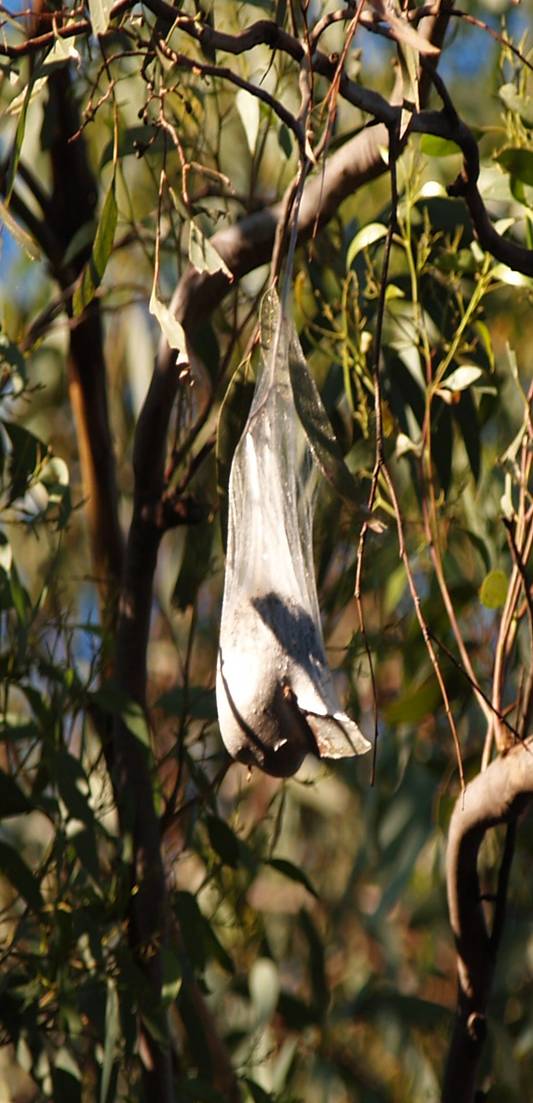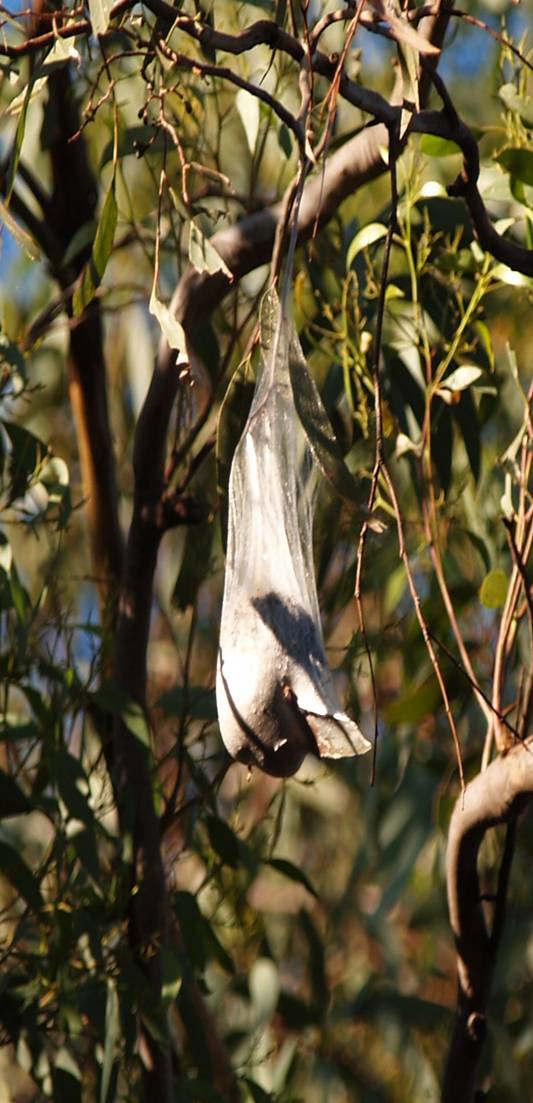 |
canberrabirds
|
 |
canberrabirds
|
| To: | |
|---|---|
| Subject: | Almost birding ...Re: [canberrabirds [SEC=UNCLASSIFIED] |
| From: | |
| Date: | Thu, 21 Feb 2008 14:31:22 +1100 |
|
The bag belongs to caterpillars of moths in the subfamily Thaumetopoeinae of the family Notodontidae. The best idea is to leave them well alone as the hairs on the larvae and the cast larval skins can cause severe urtication in humans (skin rashes and itching). The actual species involved on Eucalypts in dry parts of southern Australia is a bit open to question. The species Ochrogaster lunifer is very common throughout mainland Australia where it has a variety of biologies. On the NSW coast it is always on Acacia and the silk bag is at the base of the tree while on the Hay plains they have aerial bags on the boree (Acacia pendula). The Eucalypt bags are much less common and there are other species which might be involved. They tend not to be reared very often because of the urtication problem. There are classification problems with all the possible candidate moths. More information may be found in the "Hairy Caterpillars and skin rashes" section of "A Guide to Australian Moths" by Paul Zborowski and Ted Edwards, 2007, CSIRO Publishing. Ted Edwards CSIRO Entomology
We were birding when the sac, photo below, was discovered. Possibly an insect/caterpillar sac, approximately 300 + mm in length, was located at Rawlings Park Bush Reserve, Wagga Wagga hanging beneath the outer canopy of a Eucalyptus spp. approx. 15 metres from the ground. The sac contains what appears to be a largish round ball, dark in colour. Woven into the sac are leaves and twigs. Identification would be appreciated. Bob Carr 
We were birding when the sac, photo below, was discovered. Possibly an insect/caterpillar sac, approximately 300 + mm in length, was located at Rawlings Park Bush Reserve, Wagga Wagga hanging beneath the outer canopy of a Eucalyptus spp. approx. 15 metres from the ground. The sac contains what appears to be a largish round ball, dark in colour. Woven into the sac are leaves and twigs. Identification would be appreciated. Bob Carr 
-- This message contains privileged and confidential information only for use by the intended recipient. If you are not the intended recipient of this message, you must not disseminate, copy or use it in any manner. If you have received this message in error, please advise the sender by reply e-mail. Please ensure all e-mail attachments are scanned for viruses prior to opening or using. ******************************************************************************************************* This is the email announcement and discussion list of the Canberra Ornithologists Group. List-Post: <> List-Help: <> List-Unsubscribe: <> List-Subscribe: <> List archive: <http://bioacoustics.cse.unsw.edu.au/archives/html/canberrabirds> List manager: David McDonald, email <> |
| <Prev in Thread] | Current Thread | [Next in Thread> |
|---|---|---|
| ||
| Previous by Date: | Oh... just something to make you jealous from the South Coast (Square-tailed Kite), Suzanne Edgar |
|---|---|
| Next by Date: | Re: Oh... just something to make you jealous from the South Coast (Square-tailed Kite)Re: [canberrabirds [SEC=UNCLASSIFIED], Rod's Gardening |
| Previous by Thread: | Almost birding ..., Bob Carr |
| Next by Thread: | a correction, Mark Clayton |
| Indexes: | [Date] [Thread] [Top] [All Lists] |
The University of NSW School of Computer and Engineering takes no responsibility for the contents of this archive. It is purely a compilation of material sent by many people to the Canberra Ornithologists Group mailing list. It has not been checked for accuracy nor its content verified in any way. If you wish to get material removed from the archive or have other queries about the list contact David McDonald, list manager, phone (02) 6231 8904 or email . If you can not contact David McDonald e-mail Andrew Taylor at this address: andrewt@cse.unsw.EDU.AU